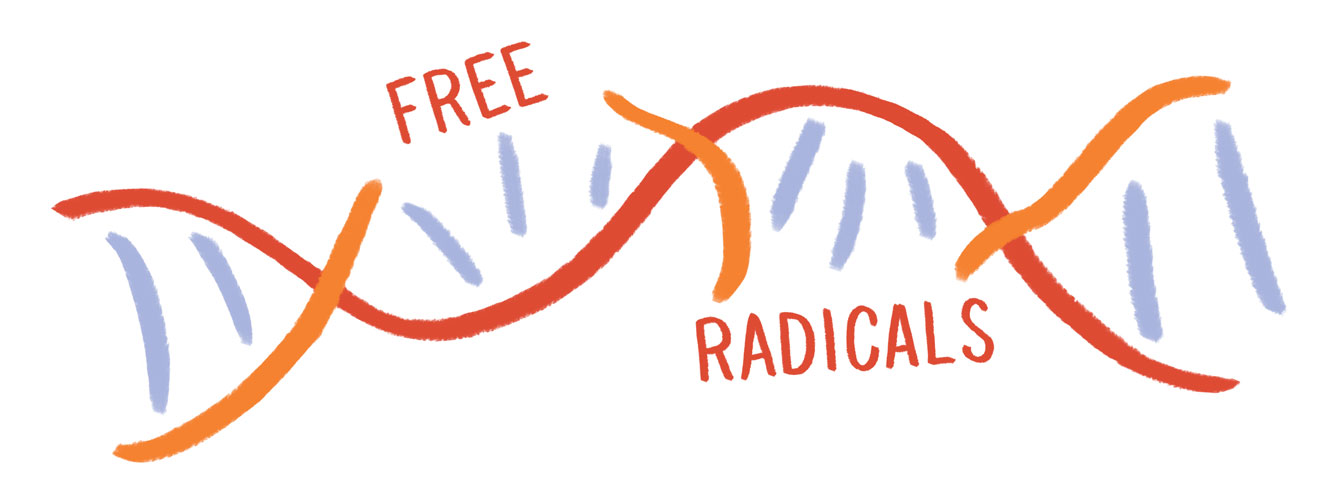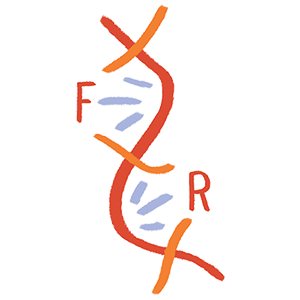
In front of a starry background, a young girl runs across psychology, child development, Asian-American Psychology, and Asian-American studies books, reaching out towards a shrouded silhouette. Artwork by Megan Yamamoto .
“When I showed up to my Harvard interview, alone in my yellow raincoat, sitting next to all these other girls with their mothers sitting next to them, I thought ‘shit’.” My mom recounted this story of her Harvard interview often. My response was silence and confusion. I still don’t really know what my mom meant by telling me this story, or even what she felt. Putting myself in her shoes, I can only guess that her mom wasn’t as involved as other mothers in her college application process and when she showed up to the interview alone, she realized that even her mother’s absence signified a difference that she couldn’t articulate. As I continued to catch glimpses of her childhood through anecdotes sprinkled throughout my childhood, I began piecing together her trauma. Even now, I stumble upon traces of her trauma growing up in New York City with a single mother who didn’t speak English.
Searching for answers to my mom’s behavior, I took psychology as an elective my senior year of high school. In class I watched movies like Sybil with Sally Fields, took psychology tests, learned about Zimbardo, the psychologist behind the Stanford Prison Experiment, and Freud. I began to understand how childhood experiences shape adult personalities and behavior and how people’s personalities are different. This first psychology class planted seeds in my head that all of my mom’s childhood anecdotes actually could be related to how she parented me.
Digging Deeper in Psychology
When I began college at Scripps, I continued to uncover the secrets of my mom’s and my own childhood, registered for a beginning psych class, Child Development and searched through the material hungrily, looking for things that resonated with me and my childhood, but mostly I was convinced that I didn’t want to have kids because of all the things that could go wrong. I still remember learning about all the factors out of the parents’ control that could cause a child to become withdrawn or delinquent. After a semester of searching for answers, I still came up empty.
A year later, I heard there was an Asian American Psychology class. The title of the course alone drew me in. Before I entered the classroom, my mind buzzed with expectation and hope for answers about my mom and myself, a place to feel seen and heard. The class surprised me. Instead of focusing on histories of Asian American immigrant experiences and trauma, the class discussed assimilation, microaggressions, and stereotypes. During the class, I came across a study that showed that Asian Americans who speak up against microaggressions in their daily life feel higher stress than Asian Americans who don’t speak up. My brow furrowed – so, fighting back when people are racist isn’t worth it? Memories of my encounters with overt racism and microaggressions flashed through my mind – even thinking of them made my blood boil. Was this what it was to be a person of color: to feel torn between feeling unstressed and wanting to shout at the aggressor? While I had been looking for resemblances of my mother and how she raised me, I had really been searching for answers to what it means to be Asian American and ways to parse out my Asian American identity. My Asian American Psychology course loosened questions that I didn’t know I was looking for answers to. This course gave me hope that psychology had been the right place to look for – as cheesy as it sounds – myself.
Asian American Herstories
After taking Asian American Psychology, I gravitated toward Asian American studies classes alongside psychology courses. There I found stories of families like mine, ones that made me feel whole and seen. The confusion I felt from my mother’s stories was soothed by stories from Hune and Nomura’s Asian/Pacific Islander American Women and Thuy’s The Gangster We Are All Looking For. It wasn’t because they were the same stories my mother told, but because their stories made me feel less alone as an Asian American woman navigating my racial identity. From absorbing immigrant narratives, my Asian American Studies education brought me to the intersection between Asian Americans and global flows of labor and money. I delved into flows of migration from China to the U.S. that drew academics and professionals like my grandparents. Outside the classroom, I engaged other students in discussions about how we often felt “in between” and privileged as Asian Americans. I had late night conversations about how our mothers scolded us for eating too much and how we could do more than show up to protests put on by Black and Brown folks. While I gathered with other Asian American women to think critically about what it looked like for our political values to show up in all parts of our lives, my psychology courses felt like they were leagues away. Where was there space in my Neuropsychology course to talk about how in arguments with my mother, we never talked about our feelings and we never confronted the root of the conflict head on? How could I exist as an Asian American woman in psychology, a field that often felt colorblind?
While working on a research project, I met a black graduate student who was studying how people of color recall memories. He talked about how a lot of research about white people show that white people often recall memories using “I” statements and are classified as having “individualistic” culture; while Asians and Latinos recall memories using “we” statements because they have a “collectivistic” culture. I asked him about how Black people recall memories. He said there has been very little to no research on that. When I asked him why, he chuckled dryly and said that Black people are only used for stereotype threat research, referring to research on how stereotypes can affect one’s performance. I stood stunned upon his answer. Seeing Black folks left out of this research felt like a flashing red sign that the injustices I was talking about in my Asian American studies classes had seeped into psychology, no matter how universal psychology had pretended to be. The idea that politics could be left out of psychological research and study, was clearly false. I was also troubled that the majority of my psychology classes hadn’t talked about race at all, let alone made space for the cultural and historical factors that I saw impact my mother’s and my mental health. These red flags led me to leave the field of psychology.
Searching for Healing
Thinking psychology was in my rear view mirror, I pursued a Masters in Asian American studies at UCLA, looking to continue to learn in classrooms where my personal experiences could be in conversation through texts and discussion topics. Many of my classes during the masters were fast paced, heavy, and dense. Sometimes I struggled to make it past the academic jargon, and other times the content weighed too heavily on my heart. Each time I read about families, mothers, and Asian American childhoods, I remembered that I had been digging for the sound of my mother’s voice through my coursework and found it buried in the trauma of other communities. I expected to feel whole, heard, and seen when I unearthed these stories in my graduate school apartment, but they left me feeling broken and bruised. During this time, psychology came back to the front of my mind. I dreamt of mental health professionals who would understand it all, through my eyes as a growing ethnic studies scholar and through my eyes as a young Asian American woman.
Tracing my path through psychology and Asian American studies, I have come to understand my mother more and continue to run through her stories and comments in my memories for more clues. On the days when I’m saddened while thinking about her trauma and her sacrifices, I am sometimes soothed by the stories of other Asian Americans. Other times, I feel twinges of pain. With talk of self-care and therapy buzzing around me, I still look for ways to lessen the daily load that we bear as Asian American women. And when the weight of the injustices piling up around us feels too heavy to bear, it’s my friends who listen, provide care, and help shoulder some of the weight as we carry it together.





